Another collaboration with Becky Hawkins!
If you like these cartoons, you can help make more happen by moving to Portland, Oregon, and specifically into the shed next to my house, and every morning wake up and break into my house and stand over me saying “write! write! draw! draw you scum draw!” over and over, for hours, until I break, and don’t forget to support the Patreon.
Many people have commented that the right-wing freak out over how “CRT” – also known as political correctness, social justice warriors, the “woke,” and so on – is crushing free speech, comes rather suspiciously at a time when speech – while not perfect – is in many ways the freest it’s been in U.S.. history.
It’s just that the biggest gains for free speech have been for women, for lgbt, for racial minorities, etc.. Not that there aren’t still free speech problems there – of course there are – but those problems are a lot less than they used to be. And once those groups and more were freer to speak up, a lot of people (mostly but not only on the right) are feeling threatened.
I do agree that some communities on the left (like some on the right) can be rigid, judgmental and unforgiving, and that’s a problem. People can feel intimidated out of speech. But – even if we count all the right-wing attacks on free speech – the idea that our era is a historical nadir for free speech is beyond ludicrous.
Cartoons that skip through historical eras are some of the most time-consuming for us to create. It takes me a long time to research these things and decide which incidents to include (in this case, I think I found 12 cases that were perfectly on-the-nose for this cartoon and could be distilled down to one panel, and with Becky’s help chose just 6 to be in the cartoon), and then it takes Becky even more time to research all the fashions and environments for each era.
Fortunately, all that time spent on research is actually a lot of fun. Because Becky and I are nerds.
Here’s just a few of the many reference photos Becky used while drawing this strip, along with Becky’s comments:
Becky: “it’s really funny to me that every suffragist article I come across has the quote ‘Well-behaved women rarely make history’ somewhere in it, when that quote originally meant more like “history is full of women we don’t learn about because they weren’t considered important enough to write down.”
Becky: “Photographic reasons for a diverse suffragette panel in 1917.”
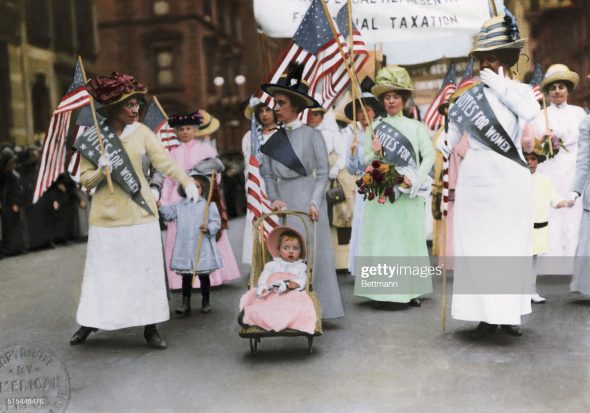
(Original Caption) American Suffragette parade in New York City, May 1912. Color Photograph. BPA 2 #6052
Becky: “…and a wearable banner that hasn’t been co-opted by TERFs.”
Becky: “I’m guessing the first version of this photo (above) was hand-tinted? The version below was colorized recently for Time Magazine. I went with the gold banners and pink hat in the cartoon because that panel already had so much blue.”
Becky: “I love the fourth outfit from the right. (I squeezed it into the background of the cartoon as clearly as I could.)”
Becky: “This cartoon has a bunch of very different settings, so I tried to make it look more cohesive by re-using colors from panel to panel. (I briefly thought about giving each panel a different color of monochromatic shading like in this cartoon, but I like how this looks in full color.) Sometimes I looked at the file without the dialogue or line art to see how the colors looked together. Here’s a screenshot I took halfway through the coloring process. I don’t think this counts as a “limited” color palette, but you can see some of the reds, blues, and browns repeating.”
TRANSCRIPT OF CARTOON
This cartoon has seven panels. Each panel shows a different scene from a different era, with the first panel set in the 1890s, and each subsequent panel set in a later time period, until the final panel which is set in the present day.
PANEL 1
A bright summer day in the 1890s. In the foreground, a Black woman is watching three white men with an aggrieved posture. She’s wearing a blue dress. In the background, a uniformed police officer is talking to two other white men, one in a brown three-piece suit with matching bowler hat, while the other man looks more working-class with a white button-up shirt, no necktie, and suspenders.
Behind the men, we can see the still-smoking ruin of what was once a building.
MAN IN SUIT: We only burned down Ida Wells’ newspaper because she wrote against lynching.
COP: That seems reasonable.
PANEL 2
In the background, we can see a group of suffragettes in 1910s dresses and hats, crowded together and looking calm but nervous. A couple of them are wearing sashes that read “votes for women.” Most of the suffragettes we see are white, but one is Black and another is Asian. The Asian woman is wearing a traditional Japanese kimono and hairstyle (modeled on Komako Kimura’s outfit and hair photographed at a 1917 suffragette march).
In the foreground, with their backs to us (so facing the women), a couple of cops are talking. One of them is slapping a palm with a billy club.
COP 1: These suffragettes were picketing the White House.
COP 2: Let the beatings begin!
PANEL 3
A wealthy looking couple, dressed in 1920s fashion (her in a blue hat with a red ribbon with flower decoration, and a matching blue jacket with puffy off-white cuffs and neck; him in an off-white suit, a straw boater with a red ribbon, blue necktie and red vest) are looking at the building across the street with some distress.
The building across the street has a sign saying “Apollo Theatre” over a revolving door entrance. A big theatre marquee over the entrances tells us that “The God of Vengeance” is playing, although the words are partly blocked by a word balloon. Another nearby sign says “Times Sq.”
WOMAN: A play with Jewish lesbians kissing?
MAN: Let’s call the police!
PANEL 4
An Asian man sits in a chair, holding up a sheet of paper. So many long horizontal strips have been sliced out of the paper that it’s made as much of holes as it is of paper. He’s wearing a collared blue shirt.
Behind him, an Asian woman leans forward to look over his shoulder. She’s wearing a red skirt and buttoned-up blouse, with a blue sweater over it. The hairstyle and clothing suggest the 1940s.
WOMAN: What’s that?
MAN: Letter from my friend Takashi in the internment camp.
PANEL 5
This panel shows two cops, a postman, and a woman in a dress. In the background, we can see a small but well-kept looking yellow house, with a tree in front and a planter under the front window.
One of the cops is putting the woman into the back seat of a police car. Judging from the woman’s hairstyle and pink, high-collared dress, this is the 1960s.
In the foreground, the postman is talking to the other cop, while pointing backwards with his thumb towards the woman. The cop is taking notes.
POSTMAN: We opened Virginia Prince’s mail and found lesbian love letters and something called “Transvestia Magazine”!
PANEL 6
We are looking at a TV set, on a table. Judging from the make of the TV and the style of the tablecloth under the TV, this is the 1970s.
On the TV a dignified-looking Black man, with white hair styled to be high on top of his head, black round glasses, and wearing a suit and tie, is speaking. (The man is Bayard Rustin.)
RUSTIN: I was arrested in the 1940s for being anti-war… In the 50s for being gay… And in the 60s for protesting Jim Crow.
PANEL 7
A current-day TV studio. Cameras and lights point at two people sitting at a table, one a middle-aged man wearing a gray suit with a blue tie, the other a younger-looking woman with black hair, glasses, and a blue short-sleeved dress. The man is spreading his arms out in an annoyed fashion while speaking, and the woman is pounding a fist on the table in front of her. “Clap clap clap” sound effects on the bottom right of the panel indicate that the unseen audience is clapping for what the woman is saying.
MAN: Nowadays straight white men can’t say anything without being criticized!
WOMAN: There’s never been a worse time for freedom of speech!
SFX: Clap clap clap clap

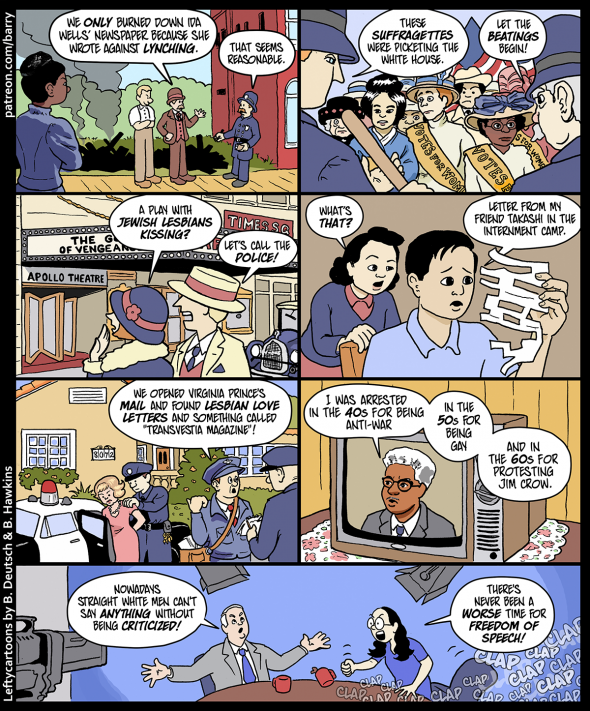
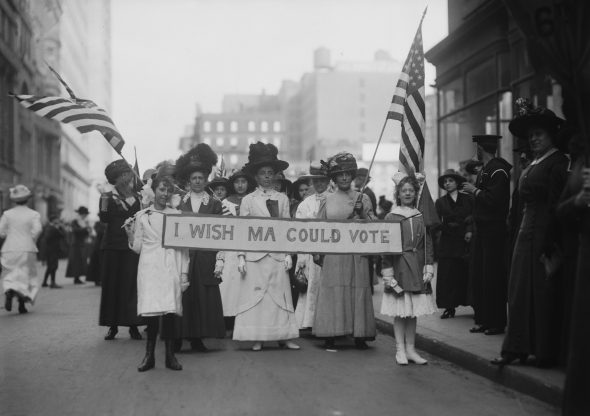
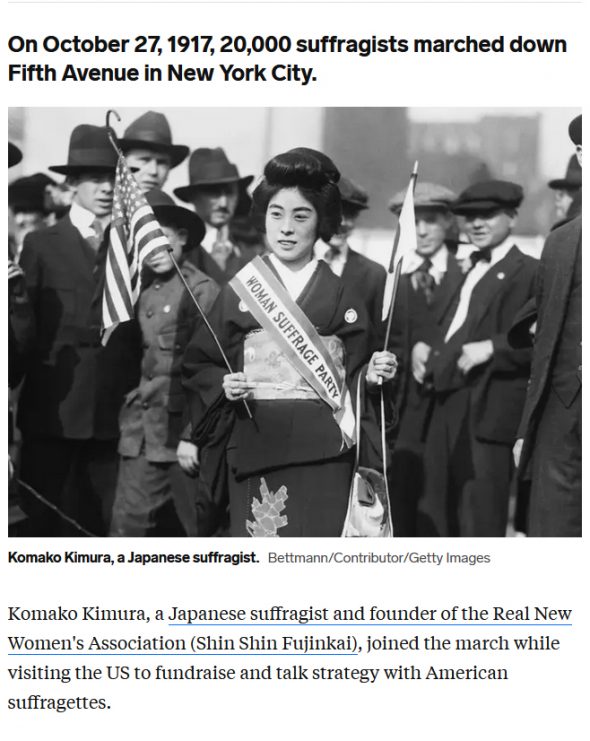
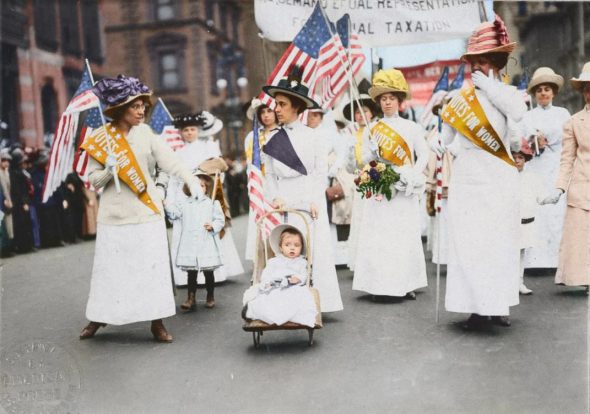
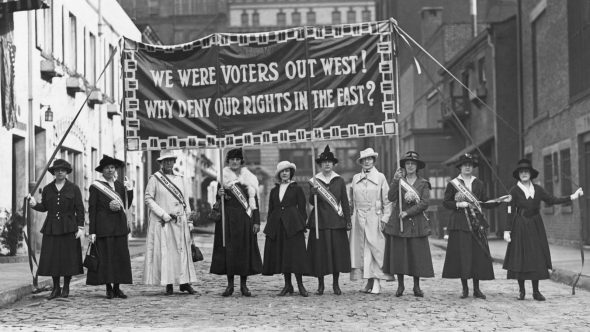
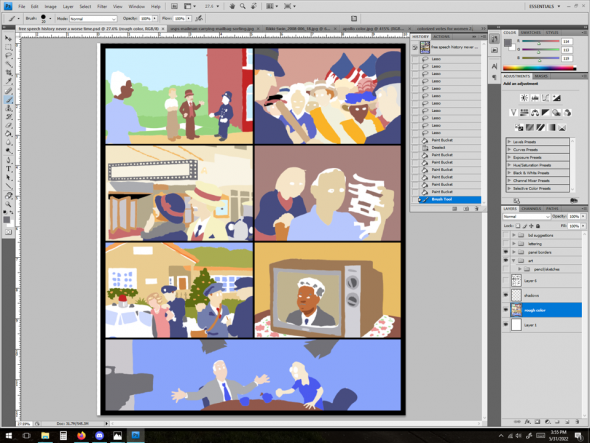
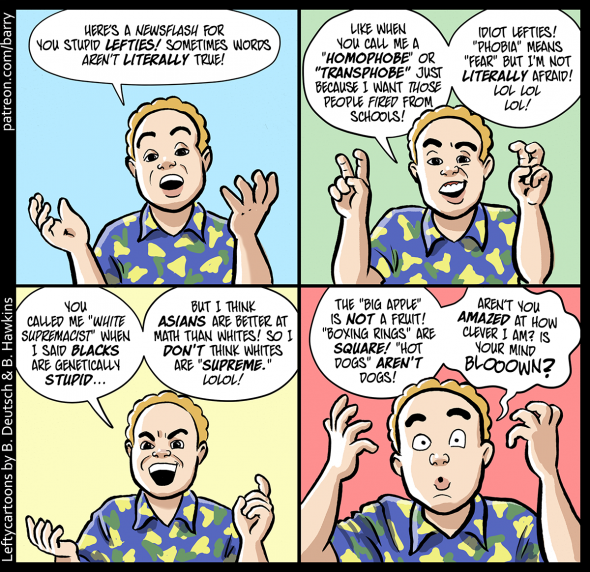
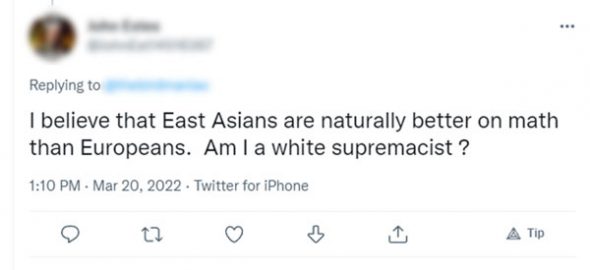


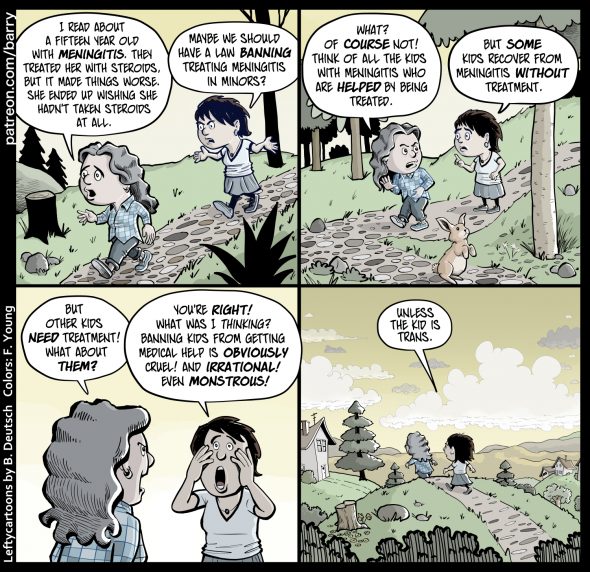
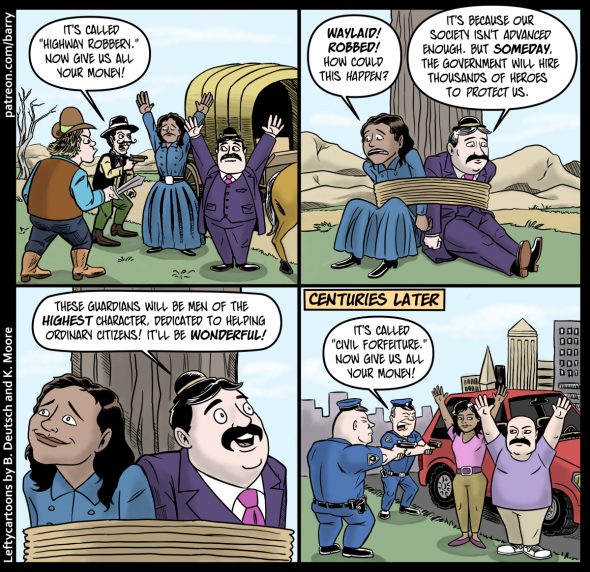
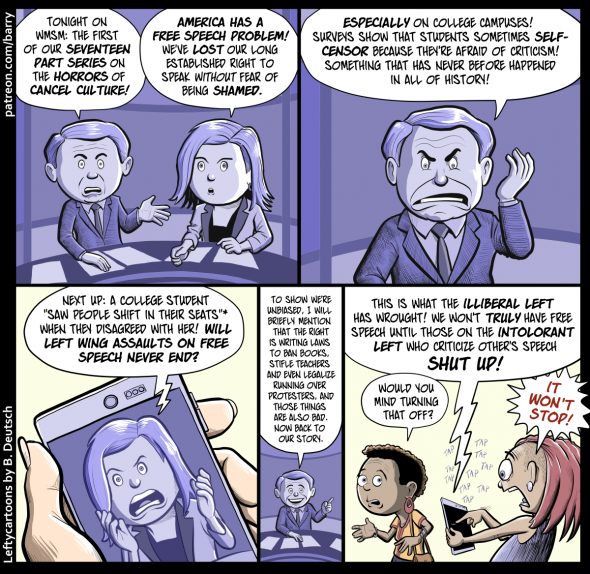
 January Fifteenth
January Fifteenth

 January 15th is the anniversary of the day Hannah looked at her universal basic income payment and realized she had the resources to take her two children and flee her abusive ex-wife. Since then, Hannah and her children have been on the run, fleeing from Abigail as she stalks them from rental home to rental home. So far, Abigail hasn’t discovered their new place in Canasota, New York, but it’s just a matter of time.
January 15th is the anniversary of the day Hannah looked at her universal basic income payment and realized she had the resources to take her two children and flee her abusive ex-wife. Since then, Hannah and her children have been on the run, fleeing from Abigail as she stalks them from rental home to rental home. So far, Abigail hasn’t discovered their new place in Canasota, New York, but it’s just a matter of time.  Since their parents were killed in a plane crash, reporter-turned-activist Janelle has been raising her little sister, Nevaeh, in their home city of Chicago.Their inheritance isn’t enough to cover all their expenses so Janelle spends her time scrambling to get as many gigs as possible. Unfortunately, legitimate news jobs are scarce, and a lot of aggregators won’t work with Janelle because of her former activism. Every January 15th, Janelle gets stuck doing the same boring interviews so she can keep their bank balance positive.
Since their parents were killed in a plane crash, reporter-turned-activist Janelle has been raising her little sister, Nevaeh, in their home city of Chicago.Their inheritance isn’t enough to cover all their expenses so Janelle spends her time scrambling to get as many gigs as possible. Unfortunately, legitimate news jobs are scarce, and a lot of aggregators won’t work with Janelle because of her former activism. Every January 15th, Janelle gets stuck doing the same boring interviews so she can keep their bank balance positive. Olivia, a freshman at Brown University, has always been the scapegoat of her dysfunctional, grandiosely wealthy high school “friends” group. Things aren’t going any better for her at college where she’s isolated and failing out. So maybe it’s not too shocking that she’s doing badly at her friends’ reunion at an expensive Colorado ski resort. Drunk and preoccupied with her own worries, Olivia barely notices her “friend” William’s bizarre “Waste Day” celebration: a contest to see who can waste their UBI payments most extravagantly.
Olivia, a freshman at Brown University, has always been the scapegoat of her dysfunctional, grandiosely wealthy high school “friends” group. Things aren’t going any better for her at college where she’s isolated and failing out. So maybe it’s not too shocking that she’s doing badly at her friends’ reunion at an expensive Colorado ski resort. Drunk and preoccupied with her own worries, Olivia barely notices her “friend” William’s bizarre “Waste Day” celebration: a contest to see who can waste their UBI payments most extravagantly. Fifteen-year-old Sarah is trapped in a cult, a fundamentalist offshoot of the Church of Latter Day Saints. Having been married off last year, she’s only a few months away from giving birth to her first child. Everyone knows that the heretical mainstream Mormons only force the prophet’s women to pick up their checks in person to harass them. But as she makes the annual pilgrimage on foot, pestered by her needy cousin Agnes and haunted by memories of her recently exiled brother Toby, Sarah’s starting to doubt what everyone knows.
Fifteen-year-old Sarah is trapped in a cult, a fundamentalist offshoot of the Church of Latter Day Saints. Having been married off last year, she’s only a few months away from giving birth to her first child. Everyone knows that the heretical mainstream Mormons only force the prophet’s women to pick up their checks in person to harass them. But as she makes the annual pilgrimage on foot, pestered by her needy cousin Agnes and haunted by memories of her recently exiled brother Toby, Sarah’s starting to doubt what everyone knows.
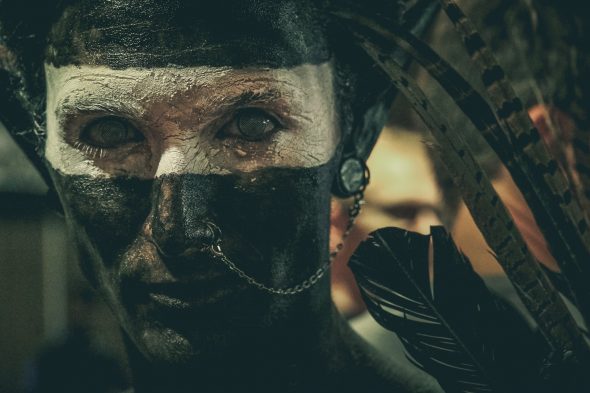



Sure, if a seven foot person needs to buy an oversized vehicle, that's fine - just as it's fine if…